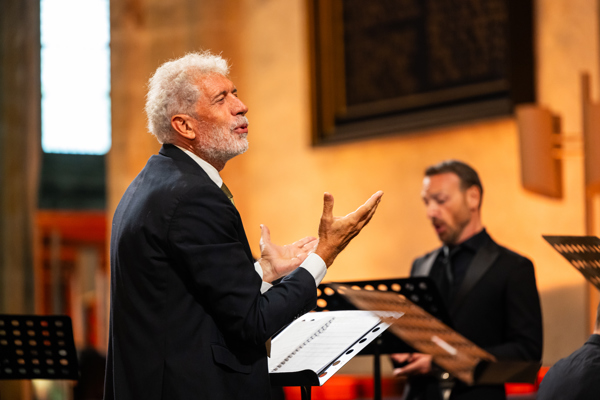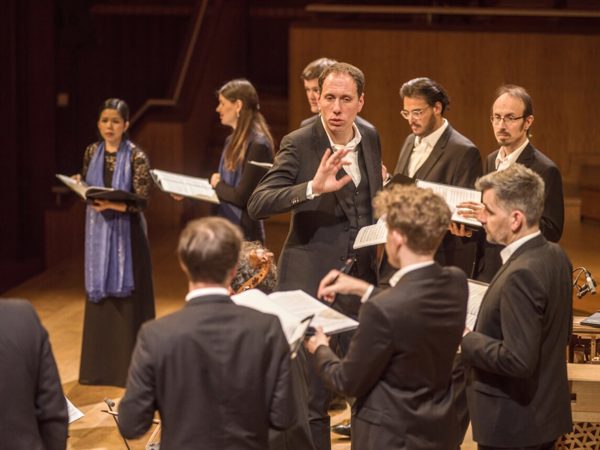A Morales EMS for 10th November 2024 - from the Utrecht Early Music Festival
Extracts from the festival brochure & website.



Morales at the Utrecht Early Music Festival - The Early Music Show
Hannah French introduces choral music by the Spanish Rennaisance composer Cristóbal de Morales, performed at the 2024 Utrecht Early Music Festival.
This year's Festival focussed on composers working in Seville in the sixteenth century such as Morales, Guerrero and Peñalosa. But with its port as a centre for global trade, many composers from other countries around the world passed through and left their mark on the musical sound of the Andalusian city at the time. Morales was born in Seville in about 1500, and became known as the 'emperor of Iberian polphony', demonstrated in performances of his music by Cantica Symphonia and Cantar Lontano, and closing with Morales's Mass for the Dead performed by Vox Luminis.
Producer: Ben Collingwood
Hannah French introduces choral music by the Spanish Rennaisance composer Cristóbal de Morales, performed at the 2024 Utrecht Early Music Festival.
This year's Festival focussed on composers working in Seville in the sixteenth century such as Morales, Guerrero and Peñalosa. But with its port as a centre for global trade, many composers from other countries around the world passed through and left their mark on the musical sound of the Andalusian city at the time. Morales was born in Seville in about 1500, and became known as the 'emperor of Iberian polphony', demonstrated in performances of his music by Cantica Symphonia and Cantar Lontano, and closing with Morales's Mass for the Dead performed by Vox Luminis.
Producer: Ben Collingwood
Extracts from the festival brochure & website.
Cantica Symphonia / GiuseppeMaletto - Motets by Morales
As a singer at the papal chapel, Cristóóbal de Morales worked among the very greatest for ten years. It was the beginning of an unparalleled musical career that would make the Sevillian the most important composer of Renaissance Spain and a figurehead of the generation of polyphonists between Josquin and Palestrina. How Morales applied his own signature style to original music of the future is demonstrated by Cantica Symphonia in this lovingly curated collection of motets.
Cristóbal de Morales - Regina caeli, Emendemus in melius, Pastores dicite, Salve regina, O sacrum convivium, Peccantem me quotidie, Gloriosus confessor Domini, Lamentabatur Jacob, Exaltata est
As a singer at the papal chapel, Cristóóbal de Morales worked among the very greatest for ten years. It was the beginning of an unparalleled musical career that would make the Sevillian the most important composer of Renaissance Spain and a figurehead of the generation of polyphonists between Josquin and Palestrina. How Morales applied his own signature style to original music of the future is demonstrated by Cantica Symphonia in this lovingly curated collection of motets.
Cristóbal de Morales - Regina caeli, Emendemus in melius, Pastores dicite, Salve regina, O sacrum convivium, Peccantem me quotidie, Gloriosus confessor Domini, Lamentabatur Jacob, Exaltata est
Cantar Lontano / Marco Mencoboni - Iberian vespers for Mary
When the sunlight gives way to dancing little candle flames, it is time for the vespers - the evening round of the liturgy of the hours that have echoed in Christian churches for centuries. By dispelling the darkness, the vespers emphasise the symbolism of the Lux Christi: the embodiment of the eternal hope of salvation. Traditionally, psalmody has been one of the main ingredients of the vespers. Each of the five psalms is preceded by a Gregorian antiphon and followed by a musical reflection. Each feast day also has its own hymn, which is paired with a Magnificat. Marco Mencoboni sought out all the pieces of the puzzle for this Iberian Marian Vespers, with glowing polyphony by Cristóóbal de Morales, Diego Ortiz, Tomás Luíis de Victoria and Francisco Guerrero. With introduction and aftertalk
Cristóbal de Morales - Sancta et Immaculata, Benedicta tu a 4, Magnificat (Magnificat omnitonum cum quatuor vocibus, Venice 1562). [et alia]
When the sunlight gives way to dancing little candle flames, it is time for the vespers - the evening round of the liturgy of the hours that have echoed in Christian churches for centuries. By dispelling the darkness, the vespers emphasise the symbolism of the Lux Christi: the embodiment of the eternal hope of salvation. Traditionally, psalmody has been one of the main ingredients of the vespers. Each of the five psalms is preceded by a Gregorian antiphon and followed by a musical reflection. Each feast day also has its own hymn, which is paired with a Magnificat. Marco Mencoboni sought out all the pieces of the puzzle for this Iberian Marian Vespers, with glowing polyphony by Cristóóbal de Morales, Diego Ortiz, Tomás Luíis de Victoria and Francisco Guerrero. With introduction and aftertalk
Cristóbal de Morales - Sancta et Immaculata, Benedicta tu a 4, Magnificat (Magnificat omnitonum cum quatuor vocibus, Venice 1562). [et alia]
Vox Luminis / Lionel Meunier - Morales’ Requiem
We are only too pleased to place him on a pedestal during this festival edition: Cristóbal de Morales, the emperor of Iberian polyphony. Born in Seville around 1500, he went down in history with music that combines the glorious Franco-Flemish counterpoint with elements from Spanish traditional repertoires. With the Officium Defunctorum and the five-part Missa Pro Defunctis, Morales established milestones in the genre of funeral music. Publications and copies can be found all over Europe, and even the New World followed the Morales trend: his Requiem is said to have graced the memorial ceremonies for Emperor Charles V in Mexico in 1599. This majestic diptych is the generous treat offered by brand new twentysomething Vox Luminis! With introduction and aftertalk
Cristóbal de Morales - Officium defunctorum, Missa pro defunctis a 5
We are only too pleased to place him on a pedestal during this festival edition: Cristóbal de Morales, the emperor of Iberian polyphony. Born in Seville around 1500, he went down in history with music that combines the glorious Franco-Flemish counterpoint with elements from Spanish traditional repertoires. With the Officium Defunctorum and the five-part Missa Pro Defunctis, Morales established milestones in the genre of funeral music. Publications and copies can be found all over Europe, and even the New World followed the Morales trend: his Requiem is said to have graced the memorial ceremonies for Emperor Charles V in Mexico in 1599. This majestic diptych is the generous treat offered by brand new twentysomething Vox Luminis! With introduction and aftertalk
Cristóbal de Morales - Officium defunctorum, Missa pro defunctis a 5



